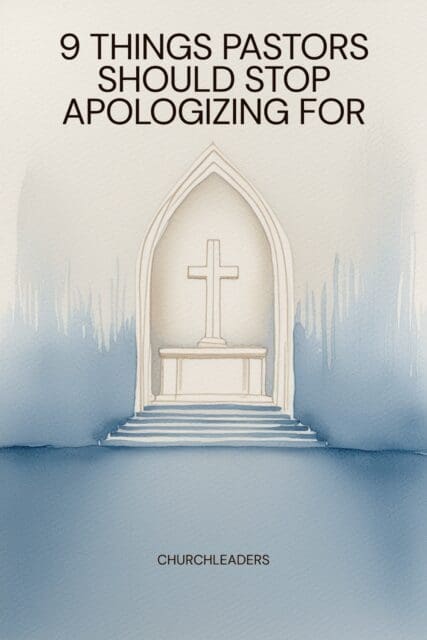Pastors live under a microscope. Every sermon, decision, and personal interaction can be dissected and discussed. While humility is a biblical virtue, there’s a difference between being teachable and living in constant apology for fulfilling your calling. The work of ministry will always invite criticism, but not every critique deserves an apology. Here are nine things pastors should stop apologizing for.
Pastors and the Burden of Expectations
Pastors carry an invisible weight of expectations—from their congregation, their denomination, and even their own families. Some of these expectations are healthy, but others can quietly drain a leader’s joy and clarity. The truth is, ministry requires balance, conviction, and courage to disappoint people sometimes. Healthy leadership means learning when to say “I’m sorry” and when to stand firm.
1. Preaching the Truth
Speaking truth in love often offends someone. But pastors are called to preach “the whole counsel of God,” not just the parts that please people. A faithful sermon sometimes disrupts comfort zones. When conviction hits hard, some will call it judgmental. Yet truth-telling is not arrogance; it’s obedience. A pastor’s task is not to keep everyone happy—it’s to help people become holy.
2. Taking Time Off
Pastors are often reluctant to rest, fearing it will be seen as laziness or lack of dedication. But rest is not a luxury; it’s a command. Even Jesus withdrew to quiet places. A tired shepherd leads tired sheep. Taking a Sabbath, a vacation, or even a mental health day isn’t indulgence—it’s stewardship. A rested leader ministers with clarity and compassion that a burnt-out one cannot.
RELATED: 15 Challenges Pastors Face Every Day
3. Setting Boundaries
A pastor’s time and energy are finite. You cannot attend every event, respond to every message, or solve every crisis. Boundaries aren’t barriers to ministry—they are frameworks that sustain it. Learning to say “no” is not selfish; it’s essential. Boundaries create room for family, prayer, study, and longevity in ministry.
4. Expecting Excellence in Worship
Wanting the worship team to rehearse, or asking for preparation and punctuality, is not being controlling. It’s valuing the presence of God and honoring the gathered church. Excellence in worship doesn’t mean perfection—it means intentionality. A well-prepared service helps the congregation focus on God, not distractions. Pastors shouldn’t apologize for calling the church to bring their best.



